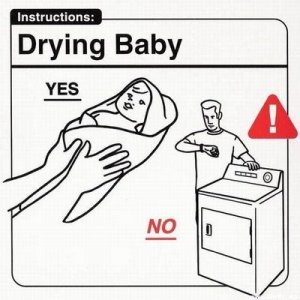The Legal Complexities Of Raising Children
 It’s lovely to see that no matter how far we’ve come as a society there will still be people to drag us back to the stone age, or in this case, late 1930s to mid-1940s.
It’s lovely to see that no matter how far we’ve come as a society there will still be people to drag us back to the stone age, or in this case, late 1930s to mid-1940s.
In case you don’t remember the saga of Heath and Deborah Campbell and their three children, back in December the couple made headlines when they enter a grocery store to buy a birthday cake for their son. They requested to have his name put on the cake, but the employee refused to on the grounds that he thought “Happy Birthday Adolf Hitler” was in bad taste. That’s right, the Campbells named their son after Adolf Hitler; you know, that Adolf. And in case you guys think it might be just be a poor coincidence, their other two children are named Aryan Nation and Honszlynn Hinler.
Anyway, the state stepped in a little while back to take custody away. The action was of course challenged by the couple, but today the New Jersey appeals court confirmed that the Nazi-loving parents would not be getting their children back.
Now before you start getting up in arms over constitutional freedoms, the reason the court took the Campbells’ kids away wasn’t because of the parents’ choice of names or their beliefs, but rather because both Heath and Deborah Campbell are unemployed and have disabilities rendering them unfit to care for children.
It’s easy for this news story to get a person thinking about the legal complexities that come with child-rearing. It’s odd to think that as recently as the 1900s, the general attitude was that parents could do whatever they wanted with their children and that it was none of the state’s business. Nowadays we have whole governmental agencies dedicated to ensuring the well-being of children.
But the party that complicates the process of raising children the most, more than any third-parties or government agencies ever could, is the parents themselves. Case in point: the Campbells. Honestly, it’s no stretch of the imagination to conclude that the whole reason the state began looking into their wacky household was because of the children’s white supremacist names. That’s the reason the story became news in the first place. You don’t see kids named John Smith making the headlines, do you?
But at least the Campbells were in the same crazy boat, as they both seem to support each other and their racist ideology. By far, the biggest legal obstacles to raising children arise when the parents don’t like each other. Divorced parents can do some nutty things, like get too much plastic surgery, buy absurdly expensive cars, or date inappropriately younger mates. Too often have I heard of stories where a divorced couple will not only use their children to hurt the other ex-spouse, but will often even wrongly deny the other party visitation rights.
This latter scenario is particularly unfavorable, as everyone is hurt (even the parent who denies the visitation right), because when a child isn’t allowed to see a parent, the kid’s pain has to hurt the one who create the situation at some level.
Parental visitation rights are such an important area that it deserves some quick legal notes on what can and cannot be done to them.
First, visitation rights carry over from state to state. Meaning that if a judge in Utah issues an order on how visitation rights should proceed and one parent jumps ship over to California, the Utah judge’s court order still stands and both parents must adhere to it.
Second, if a parent does move to another state, the best course of action to ensure you’ll have an easier time enforcing the original judge’s order is to register that judge’s order with the court of the other parent’s new residence. Doing so will save you a hell of a lot more time and effort if it ever comes to the point where you need to get that state’s local authorities involved.
If you’re ever denied visitation rights, register a complaint with the police immediately because visitation rights as issued by a judge are considered court orders and not following them is a violation of the court’s authority. You can then go to the court and get them to issue a contempt of court violation against the other parent. This can carries penalties such as jail time and fines, and will help deter the disobeying parent from denying your visitation rights again.
Also remember, that the court that originally issued the order retains jurisdiction over the case, meaning you don’t have to travel to the court of your ex’s new state in order to get your court order validated.
So what’s the lesson to all this madness? Raising children is tough enough, but don’t make it more difficult by giving the government a legal reason to step in. Remember, think of the children.

Comments